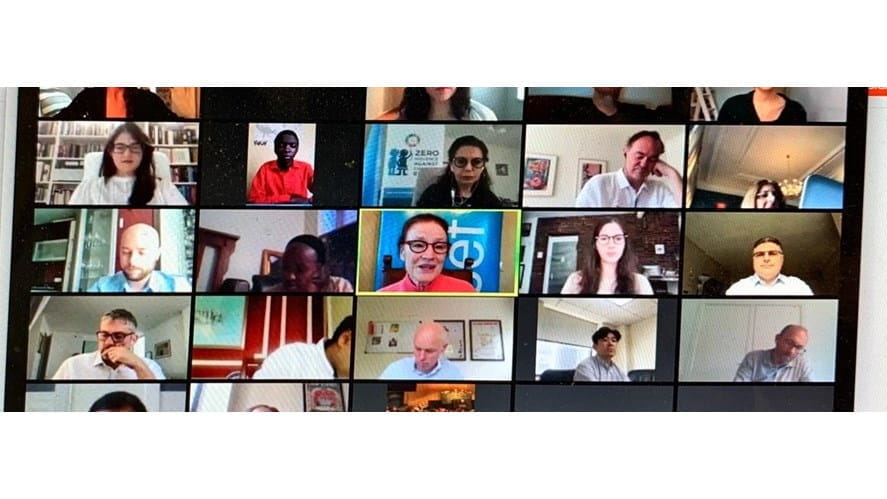We use cookies to improve your online experiences. To learn more and choose your cookies options, please refer to our cookie policy.

The ‘Group of Friends’ is a group of 63 UN Member States. They formed when the Sustainable Development Goals (SDGs) were being negotiated to ensure child rights and voices were appropriately reflected. They continue to meet and advocate for the SDGs to be implemented and attend the High-Level Political Forum annually to amplify and review action against important issues.
Good morning/afternoon everyone. I am Elodie Camus, a 17-year-old recent graduate of the British International School in Washington D.C.
I hope everyone is safe and healthy. Thank you for taking the time to be here today. Thank you for having me here.
Today, I want to talk to you about the importance of educating and engaging children and young people in achieving the SDGs.
I have learned that the Group of Friends has worked for years to involve children and include the rights of the child in the 17 sustainable development goals. Given current events, it has become ever so clear that children and young people are the key to achieving each goal. In recent years, we have seen more young people come out to protest than ever before, with their voices being the catalyst for change around the world.
Of course, the achievements caused by youth involvement is not all we can focus on today, as children everywhere are still suffering, suffering that is sadly amplified by the Covid-19 crisis. I realize how lucky I am to be here safely in my own home with my family and I have immense gratitude for that.
However, too much of the population is not so lucky, with vulnerable children being one of the most significantly impacted groups by the pandemic. Young people are demanding a better future, but meanwhile children and youth are often left behind. Here today, many of us understand the importance of children and young people in achieving the SDGs. However, it has become evident that child and youth inclusion in decision making is still too often put on the backburner. I understand that the UN is calling for us to “build back better.” To build back better, the ideas and solutions of children and young people must be included.
Including children and youth on the SDGs starts with SDG education. I have been very lucky with my education and had the privilege of attending a Nord Anglia school where the SDGs are prioritized within our education. A few years ago, a few older students asked me to be part of the Global Goals Student Club. This past year, I became the Global Goals President. In that role, I helped share SDG information to my peers through school assemblies, organized SDGs activities, and developed a Global Goals action plan that helped us achieve more sustainable consumption and production habits within school. We successfully implemented a recycling and compost program, initiated Meatless Mondays, and installed water filters to encourage students to stop using plastic water bottles. Each day leading the club I learnt more about the importance of engaging children and youth in achieving the goals.
This year we wanted to work towards the GOLD eco-school award. Seeing students jump to action when the climate strike took place in the US in September sparked a great sense of pride as I knew my engagement efforts had made a difference amongst our school community. Young people have inspired other people – across generations – to take action. If that isn’t evidence enough of the importance of children in achieving the SDGs, I don’t know what is.
It is important that not only my school, but all schools have access to SDG education. The SDGs don’t only affect my school but affect all students, everywhere. Some of my peers and I worked with young people in Tanzania where we learned more from them about how the SDGs are intertwined and vital for every aspect of every life. Working with their communities provided us with numerous unforgettable experiences, as well as a newfound rush of gratitude every time we turn on a faucet. For me, the importance of children and youth became extremely clear when a 5-year-old boy took interest in the solar lighting that I was putting up with the help of another student. When we had finished, the boy jumped to the two light switches that were newly fastened to the wall and continuously flicked them on and off with a huge smile on his face.
This gave me an understanding of how a child craves the ability to contribute to and see change. This boy now had light in his home, and even at such a young age, he relished the fact that he had the power to change it. Children of all ages everywhere, want to be part of the change.
The influence that children and young people have in shaping the future of our countries is something that has been overlooked in the past but it is time now to fully understand and accept that this effort NEEDS us young people.
To reach more children and young people, and as the Group of Friends of Children and the SDGs, I hope you all continue to support SDG education and engagement of children in your own countries so we can work together on the solutions across generations.
Just as older students asked me to get involved with the global goals a few years ago, I am excited to see what the students who come after me will do to make the global goals a reality. The need for educating and engaging children and youth in the SDGs should be of upmost importance as we are setting an example for generations after us, who will need to carry on the work we have started to build a better world.